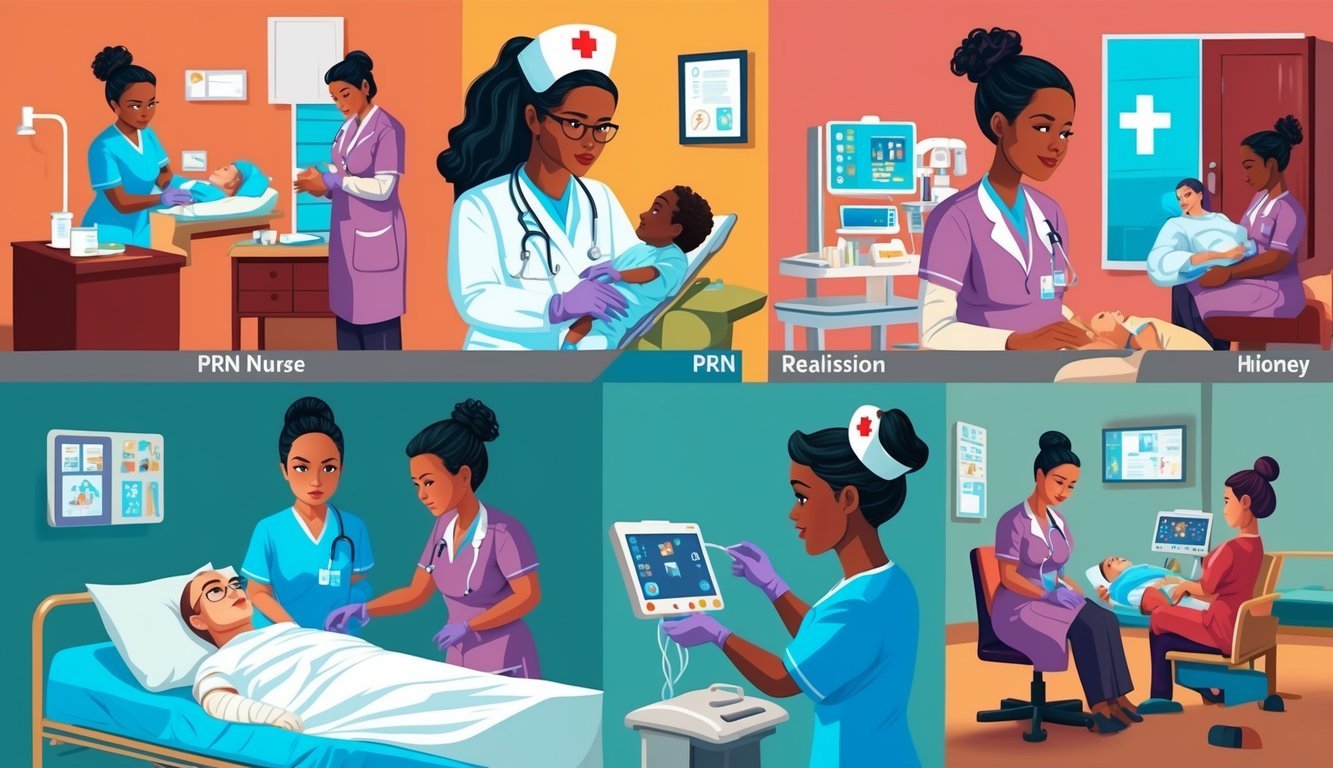The role of a PRN nurse, also known as a “pro re nata” nurse, involves providing care on an as-needed basis. This flexibility allows you to choose when and how much you work, making it an appealing option for many nursing professionals.
Whether you’re balancing personal commitments or seeking diverse experiences in different healthcare settings, being a PRN nurse offers unique advantages.
In practice, PRN nurses fill gaps in staffing, stepping in during busy shifts or when permanent staff members are unavailable.
This role requires you to be adaptable and ready to take on various responsibilities across different departments.
Working as a PRN nurse means you maintain your licensure while enjoying the freedom to dictate your schedule, which can enhance your work-life balance.
If you are curious about becoming a PRN nurse or want to understand more about the challenges and rewards of this career path, you will find valuable insights throughout this article.
Resources are available to help you navigate this flexible nursing opportunity, from understanding typical responsibilities to exploring pay scales and scheduling options.
Understanding PRN Nursing
PRN nursing plays a crucial role in offering flexibility within healthcare environments.
It allows healthcare facilities to efficiently manage patient care based on immediate needs.
Definition and Overview
PRN stands for “pro re nata,” a Latin term meaning “as needed.” This type of nursing involves providing care based on specific patient requirements rather than a fixed schedule.
PRN nurses typically work on an as-needed basis, filling in for full-time staff during busy shifts or when coverage is required.
This approach benefits healthcare settings by ensuring adequate staffing while allowing nurses to balance their work and personal commitments.
In practice, PRN nursing can include administering medications, performing assessments, and responding to patient needs in real-time.
This flexibility is essential for maintaining quality care in various healthcare facilities.
Role in Healthcare Facilities
PRN nurses are invaluable in healthcare facilities, enhancing operational efficiency.
They help manage patient loads during peak times, such as emergencies or seasonal surges in patient volume.
This staffing strategy allows registered nurses (RNs) to focus on more critical cases while ensuring all patients receive necessary attention.
Additionally, PRN nursing can reduce overtime costs for full-time staff.
Many healthcare organizations find that employing PRN nurses helps prevent burnout among full-time employees by distributing workloads more evenly.
PRN nurses often require the same qualifications as full-time RNs, ensuring they have the skills necessary to deliver effective patient care in dynamic environments.
Comparing PRN to Full-Time Nursing
The primary difference between PRN and full-time nursing roles lies in the nature of employment.
PRN nurses typically work on a flexible schedule, which may appeal to those seeking part-time opportunities or an alternative to traditional roles.
In contrast, full-time nurses have fixed schedules and benefits, providing job stability and consistent income.
| Feature | PRN Nursing | Full-Time Nursing |
|---|---|---|
| Schedule | Flexible, as needed | Fixed, regular shifts |
| Employment Type | Temporary, part-time | Permanent, full-time |
| Benefits | Limited | Comprehensive |
| Focus | Immediate patient needs | Ongoing patient care |
Understanding these differences can aid you in making an informed choice about your nursing career path.
While both roles contribute to patient care, your personal circumstances and preferences will guide your decision.
The Professional Life of a PRN Nurse
As a PRN nurse, your professional life revolves around a unique blend of flexibility and responsibility.
You adapt to various settings while managing essential nursing tasks.
Here’s an overview of what that entails in your day-to-day life.
Day-to-Day Responsibilities
Your daily tasks as a PRN nurse may vary significantly based on the specific facility and patient needs.
Common responsibilities include:
- Monitoring patient symptoms and vital signs.
- Administering medications, including IV drips and oral doses.
- Performing diagnostic tests and documenting medical records.
- Assisting with procedural tasks or patient education.
Since PRN nurses work on an as-needed basis, you may find yourself in different departments or settings, from hospitals to outpatient clinics.
Adjusting quickly to new environments is crucial, as you often step in during staffing shortages or peak times.
Skill Set and Flexibility
Flexibility is one of the primary benefits of being a PRN nurse.
You possess a diverse skill set that includes:
- Critical thinking: Making informed decisions in varying situations.
- Communication: Effectively interacting with patients, families, and medical teams.
- Adaptability: Quickly adjusting to new protocols and patient care plans.
Your ability to work irregular hours allows you to accommodate personal commitments.
This flexibility means you can choose shifts that align with your lifestyle, which can enhance overall job satisfaction and personal well-being.
Achieving Work-Life Balance
Maintaining a work-life balance is essential for your mental and physical health.
As a PRN nurse, you have the opportunity to create a schedule that works for you.
Here are some strategies to consider:
- Prioritize self-care: Make time for yourself, pursuing hobbies or relaxation techniques.
- Set boundaries: Clearly define when you are available to work and stick to those commitments.
- Stay organized: Use scheduling tools or apps to keep track of shifts and personal obligations.
Being a PRN nurse allows you to enjoy the freedom of flexible scheduling, which can lead to a more balanced professional and personal life.
For more information, refer to resources like Nurse.org for insights on PRN nursing practices and opportunities.
Career Path and Advancement
Embarking on a career as a PRN nurse offers flexibility and unique opportunities for advancement.
Understanding the educational requirements and pathways to permanent positions can enhance your career trajectory.
Exploring further specializations will also open doors for advancement.
Educational Requirements
To become a PRN nurse, you must hold at least an Associate Degree in Nursing (ADN) or a Bachelor of Science in Nursing (BSN).
While both degrees qualify you for the Registered Nurse (RN) license, a BSN is increasingly preferred by employers.
Educational programs typically include coursework in anatomy, pharmacology, and patient care techniques.
After completing your degree, you must pass the NCLEX-RN exam to obtain your license.
Some nurses choose to pursue a Master of Science in Nursing (MSN) to enhance their qualifications.
This can facilitate growth into specialized roles or leadership positions within healthcare.
From PRN to Permanent Positions
Many PRN nurses transition into full-time roles as they gain experience and build relationships within healthcare settings.
Being versatile and adaptable can help you stand out in a competitive job market.
Working PRN often allows you to showcase your skills without the commitment of a full-time position.
Notably, hospitals and healthcare facilities tend to favor PRN nurses for permanent roles due to their familiarity with the team and workflow.
To improve your chances, consistently demonstrate strong clinical skills, reliable attendance, and effective communication with both patients and colleagues.
Pursuing Further Specializations
Specializing in a specific area of nursing can significantly enhance your career advancement.
Many PRN nurses take advantage of additional training to become subject matter experts in areas such as critical care, pediatrics, or gerontology.
Certification programs are available to deepen your expertise and may lead to higher salaries and job security.
Consider enrolling in relevant courses or obtaining certifications aligned with your career goals.
Specialized qualifications are often beneficial, especially in high-demand fields.
You can explore additional specialization opportunities to make informed decisions about your career advancement.
Challenges and Rewards of PRN Nursing
PRN nursing offers unique experiences that come with both challenges and rewards.
Understanding these factors can help you make informed decisions about your career path in nursing.
Managing Uncertainty and Anxiety
As a PRN nurse, you may face a constant sense of uncertainty regarding your work schedule.
Unlike full-time positions, the lack of a predictable routine can lead to anxiety.
You might receive shift notifications at the last minute, making it challenging to plan your personal life.
Moreover, adapting to various healthcare settings adds another layer of complexity.
Each facility has its own protocols, requiring you to be flexible and quick to learn.
This dynamic environment can be stressful, particularly if you are inexperienced in handling diverse clinical situations.
Being prepared for unexpected challenges is key.
Developing strategies to manage this unpredictability can help alleviate some of the accompanying anxiety.
Benefits of Per Diem Nursing
Despite the challenges, PRN nursing offers considerable benefits that can enhance your career and lifestyle.
One significant advantage is the flexibility to choose when and where you work.
This can lead to a better work-life balance, allowing you to pursue additional interests or education.
Another benefit is the potential for higher pay rates.
PRN nurses are often compensated with a premium for their flexibility and on-demand availability.
This can lead to increased earnings compared to traditional employment models.
Furthermore, working in diverse environments helps you build a broad skill set.
Exposure to different teams and practices fosters professional growth, enhancing your marketability within the nursing field.
To explore more about PRN nursing, you can check resources like Shiftkey for insights.
PRN Nursing in Different Settings

PRN nursing roles vary significantly across different healthcare environments, each with unique responsibilities and challenges.
Understanding these differences can help you grasp how PRN nurses contribute to patient care in various scenarios.
Hospital Environments
In hospitals, PRN nurses often fill gaps in staffing during peak times, such as weekends or holidays.
Your role may involve administering medication, monitoring vital signs, and collaborating with other healthcare professionals.
Working in a fast-paced environment, you must quickly adapt to changing patient needs.
Effective communication and teamwork are crucial to ensure patients receive appropriate care.
Key Duties:
- Administer medications as needed.
- Monitor and document patient conditions.
- Assist in procedures and follow discharge protocols.
Long-term Care and Rehabilitation
In long-term care facilities, PRN nurses aid in providing continuous support for residents, especially those with chronic conditions.
Your responsibilities might include administering treatments, assisting with daily activities, and maintaining detailed records.
You play a vital role in developing care plans tailored to individual patient needs.
Establishing a rapport with residents and families enhances the quality of care provided.
Key Duties:
- Evaluate patient progress and response to treatments.
- Collaborate with multidisciplinary teams.
- Educate residents and families about health management.
Outpatient Clinics and Specialized Centers
PRN nurses in outpatient clinics focus on specific patient populations, such as those needing specialized care or preventive services.
Your role may involve conducting assessments, providing health education, and supporting follow-up care.
These settings allow you to work more closely with patients, often fostering longer-term relationships.
Flexibility and adaptability are essential.
You may encounter diverse cases on different shifts.
Key Duties:
- Conduct patient assessments and screenings.
- Manage administrative tasks and patient documentation.
- Provide education on health maintenance and preventive care.
Understanding the distinct roles of PRN nurses across various healthcare settings enhances your ability to deliver effective patient care.

